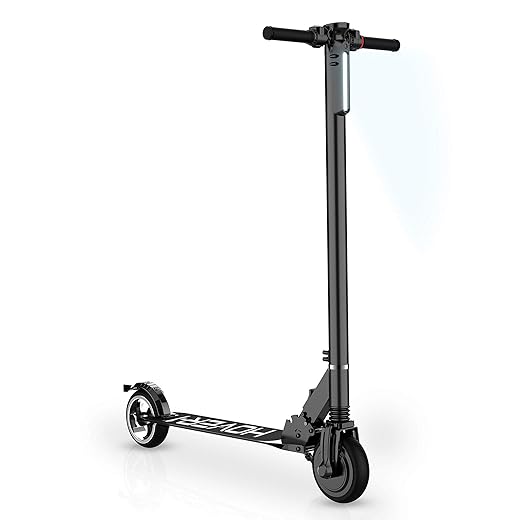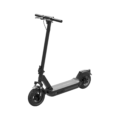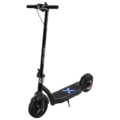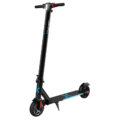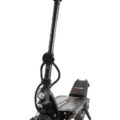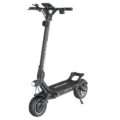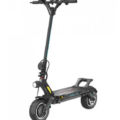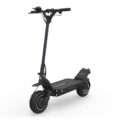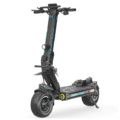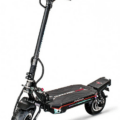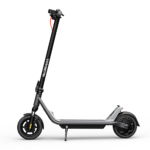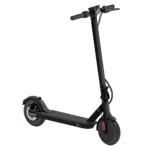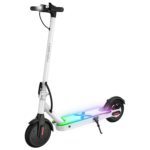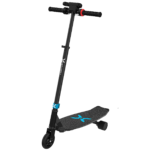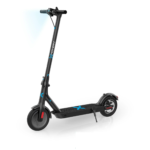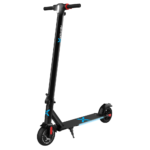- Home
- Scooters
- Electric Scooters
- Hover-1 Rally
Hover-1 Rally
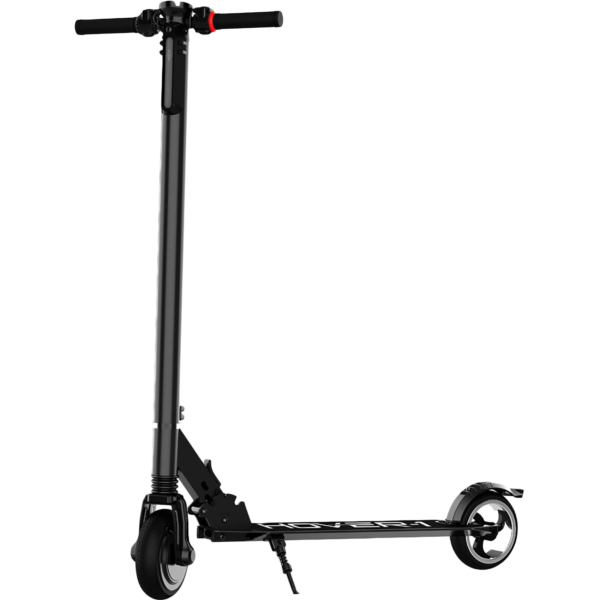

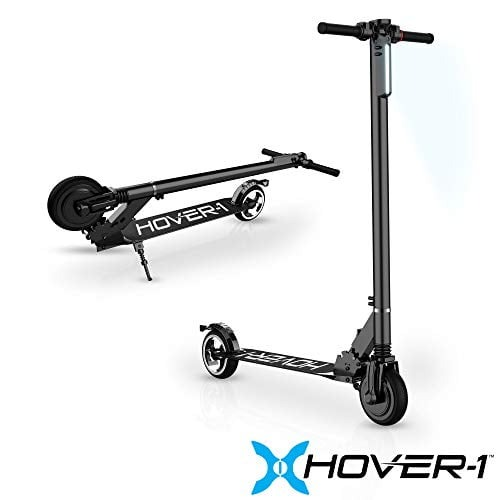
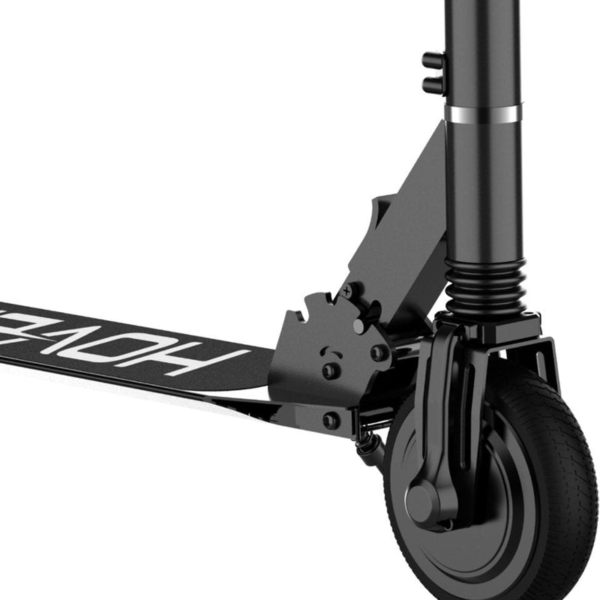
- Battery Range: 12 miles (19 km)
- Top Speed: 12 mph (19 km/h)
- Motor Power: 300 W
- Weight Capacity: 264 lb (120 kg)
- Charging Time: ~4 h
- Scooter Weight: 25.1 lb (11.4 kg)
PROS
- Compact 6.5″ solid tires
- Lightweight ~25 lb
- 300W brushless motor
- LCD display
- Cruise control
CONS
- Short range in real use
- Small wheels harsh on rough roads
- No IP rating published
Table of contents
- What Is the Hover-1 Rally?
- How the Hover-1 Rally Works
- Key Specifications
- Design & Build Quality
- Performance Fundamentals
- Battery, Range & Efficiency
- Ride Quality & Comfort
- Braking & Safety Features
- Portability & Daily Usability
- Maintenance & Care
- Weather & Seasonal Considerations
- Hover-1 Rally vs Alternatives
- Who the Hover-1 Rally Is (and Isn’t) For
- FAQs
- Glossary
- Final Notes on Fit and Use
If you want a small, simple, and dependable scooter for short hops, the Hover-1 Rally keeps things easy. It folds fast, carries light, and focuses on the basics that matter for quick errands and first-mile/last-mile rides. Because it uses solid tires and a compact 36V battery, the Hover-1 Rally is built for flat city blocks, campus paths, and casual neighborhood trips—not all-day touring or steep hills.
What Is the Hover-1 Rally?
The Hover-1 Rally is an ultralight, folding electric scooter designed around practical city speeds and quick commutes. It uses a 320W brushless hub motor, a 36V lithium-ion pack, and 6.5-inch non-pneumatic (solid) tires. Consequently, it is easy to store in a closet or under a desk, and it is straightforward to carry on stairs or into public transit. Because it weighs about 21.8 lb (9.9 kg), most riders can lift it one-handed.
This model sits at the “entry commuter” end of the spectrum. Therefore, it prioritizes simplicity over high performance. You get a clear LCD display with speed and battery readouts, three selectable speed levels, and an electronic brake complemented by a mechanical fender brake. Meanwhile, a front LED headlight helps with dusk visibility. As a result, it feels intuitive on day one and stays low-maintenance over time.
How the Hover-1 Rally Works
At a high level, an e-scooter is a simple system: a battery stores energy, a controller meters that energy, and a motor turns it into motion. The Rally follows that exact recipe, with hardware tailored for short urban rides.
- Motor & Controller. A 320W brushless hub motor sits inside one wheel. The controller acts like the scooter’s brain, translating throttle input into smooth current delivery. Press the throttle, and the controller feeds the motor; release it, and the controller reduces power and engages electronic braking.
- Battery. The 36V lithium-ion battery (4.0Ah) stores roughly 144Wh of energy (36V × 4Ah). Think of that as a small “fuel tank” sized for errands. Because the pack is compact, the scooter charges fully in up to 4 hours.
- Throttle. A thumb-operated accelerator gives linear control. Press gently to creep forward or hold it to cruise. Double-press quickly to enable cruise control at your present speed; press again to cancel.
- Brakes. The system combines an electronic motor brake with a mechanical brake at the rear fender. Lightly releasing the throttle gives mild deceleration from the motor, while a strong stomp on the fender provides immediate, mechanical stopping power. Used together, they deliver predictable, short-distance stops at the Rally’s modest top speed.
Because each part is doing just one job—and doing it simply—the Rally feels approachable for new riders and convenient for daily use.
Key Specifications
Below are the official core specs, grouped for quick scanning. Values are listed in both imperial and metric units.
| Block | Item | Value |
|---|---|---|
| General | Model | H1-RALY |
| Class | Ultralight folding electric scooter | |
| Performance & Power | Motor | 320W brushless hub motor |
| Top Speed | Up to 12 mph (19.3 km/h) | |
| Battery, Charging & Electrical | Battery | 36V lithium-ion, 4.0Ah (≈144Wh) |
| Charge Time | Up to 4 hours | |
| Charger / Input | AC 100–240V, 50/60 Hz | |
| Display | LCD: speed, speed level, battery, odometer, trip distance, voltage, trip time | |
| Lights | Front LED headlight | |
| Build & Dimensions | Net Weight | 21.8 lb (9.9 kg) |
| Open Size (L × W × H) | 37.96 × 16.54 × 42.8 in (96 × 42 × 109 cm) | |
| Folded Size (L × W × H) | 44.09 × 16.54 × 11.02 in (112 × 42 × 28 cm) | |
| Tires | 6.5 in (16.51 cm) non-pneumatic solid tires | |
| Safety & Control | Brakes | Electronic motor brake + mechanical fender brake |
| Rider Weight | Max 264 lb (120 kg); Min 44 lb (20 kg) | |
| IP Rating | Not specified; avoid water exposure | |
| Features & Extras | Speed Levels | 3 selectable modes |
| Cruise Control | Yes (double-press throttle to set/cancel) | |
| Kickstand | Side kickstand | |
| Warranty & Compliance | Warranty | 90-day limited parts & labor for manufacturing defects |
| Compliance | FCC Class B digital device statement |
These official specifications define the Rally’s intended use: short trips, flat terrain, and simple daily commuting.
Design & Build Quality
Although it’s budget-friendly, the Hover-1 Rally shows careful attention to everyday details. The folding joint uses a lever near the deck; it locks with an audible click both up and down. Because the scooter is light, the hinge experiences less load than on heavier models, which helps minimize long-term play when kept tightened correctly.
The cockpit is uncluttered. You’ll find an LCD module centered or slightly offset, flanked by a thumb throttle and brake control. The screen is bright enough to read in daylight, and the simple icons reduce decision fatigue. Speed level buttons (1–3) let you pick a cap that matches the path and your comfort. As a result, beginners can start slow while experienced riders cruise in mode 3.
The deck is low and flat, making stepping on and off easy. Grip is firm under sneakers, and the overall stance is upright. Because the tires are solid and small, you’re encouraged to keep to smoother surfaces; the scooter rewards gentle, anticipatory riding. Fit and finish are consistent for the category, and the paint resists casual scuffs. While the handlebars aren’t height-adjustable, the standing posture fits most teens and adults up to the listed weight limit.
Performance Fundamentals
At 320 watts, the Rally is tuned for city-speed errands. Off the line, the motor pulls cleanly without a jolt. In speed level 1, throttle response is mellow; this is ideal for crowded sidewalks and shared paths where precision matters. Level 2 adds headroom for neighborhood streets. Level 3 unlocks the model’s rated top speed. Because acceleration ramps gently, maintaining balance is straightforward even for new riders.
Cruising stability is good for an ultralight. The short wheelbase and 6.5-inch solid tires feel planted at 8–10 mph; as you approach 12 mph, the deck still tracks true provided the surface is smooth. If a wobble develops on rough pavement, shift your weight softly toward the front foot, bend your knees, and reduce speed a notch—this calms the chassis quickly.
Hill behavior reflects the motor’s size. On rolling city blocks—think 7–10% grades for short segments—the scooter can crest with a run-up, especially with lighter riders. Heavier riders will feel the speed dip sooner and may prefer to assist with a kick on steeper ramps. Because the controller protects the system from prolonged high current, it will ease power if you try to climb extended steep hills. Plan routes that favor flats and gentle inclines for the best experience.
Battery, Range & Efficiency
Hover-1 rates the Rally for up to 7 miles (≈11.3 km) per charge under ideal conditions. Real-world results vary because energy use changes with speed, weight, temperature, and terrain. As a rule of thumb:
- Energy capacity: ~144Wh.
- Typical consumption: about 12–18Wh per mile on flat ground at moderate speeds.
- Practical range: roughly 4–7 miles for many riders, depending on conditions.
Because the pack is modest, efficient habits pay off. Ride in level 2 when possible, coast early toward stops, and avoid full-throttle sprints into headwinds. Meanwhile, cold weather lowers battery output; range can shrink when temps drop near the battery’s lower operating limit (32°F / 0°C). On hot days, give the scooter a rest between long pulls, and let the pack cool before charging.
Charging best practices
- Let the scooter sit a few minutes after a ride so the pack stabilizes.
- Use the supplied charger and check that the charge port is dry and clean.
- Expect a full charge in up to 4 hours; unplug once the indicator turns green.
- For storage longer than a couple of weeks, leave the battery around half full and top up briefly every month.
By pairing considerate riding with gentle charging habits, you’ll protect capacity and keep the scooter consistent across seasons.
Ride Quality & Comfort
Solid tires define the Rally’s road feel. The upsides are obvious: no flats, no pumping, and minimal fuss. Additionally, small solids roll efficiently on smooth asphalt and polished concrete. The trade-off is that cracks and expansion joints feel sharper than they would on larger pneumatic tires. Therefore, plan routes with smoother surfaces when possible, and bend your knees over rough patches to let your legs act as suspension.
Because the deck rides low, you get a stable center of gravity at city speeds. The stem is slim, which reduces weight; a tiny bit of flex can appear over uneven ground, but it stays within normal bounds for an ultralight. Hand fatigue is low at 8–10 mph, and the simple thumb throttle prevents wrist strain on longer flats. Cruise control helps too—set a steady pace and relax your thumb while you scan the road.
Braking & Safety Features
The Rally uses a two-stage braking approach:
- Electronic motor brake: Releasing the throttle triggers gentle deceleration. It’s smooth and confidence-building for speed trimming and short, predictable stops.
- Mechanical fender brake: Press down on the rear fender for immediate friction on the wheel. This is your stronger stop, and it provides a reassuring “bite” once you commit.
Use the electronic brake early, then add the fender as the stop zone approaches. Because the scooter’s top speed is modest, stopping distances are manageable when you keep a safe buffer and ride defensively.
Lighting & visibility
A front LED headlight improves low-light awareness. However, the scooter is not equipped with reflectors from the factory. Therefore, consider wearing reflective clothing and adding stick-on reflectors to your helmet or backpack for nighttime visibility. As always, wear a properly fitted helmet and follow local rules.
Water exposure
No formal IP rating is listed. Consequently, avoid puddles, heavy rain, or hose spray. Water can damage electronics, bearings, and the battery over time. If you’re caught by a surprise sprinkle, slow down, steer around standing water, and dry the scooter afterward.
Portability & Daily Usability
Portability is where the Hover-1 Rally shines. At 21.8 lb (9.9 kg), it feels closer to a small folding bike than a typical scooter. The fold lever near the deck is quick to operate, and the scooter collapses to 44.09 × 16.54 × 11.02 in (112 × 42 × 28 cm). As a result, it fits behind a door, under a desk, or in a car trunk with room to spare.
Carrying tips
- Grab the stem near the hinge for a balanced lift.
- Keep the deck facing away from your legs to avoid scuffs.
- On trains or buses, stand with the folded scooter between your feet for stability.
Daily storage is simple. Store indoors and out of direct sun. Because the pack is small, topping up after a commute won’t strain your schedule, and you’ll be ready for the return trip.
Security remains essential. A compact frame is easy to lift, so don’t leave the Rally unattended outdoors. If you must step away briefly, bring it inside whenever possible.
Maintenance & Care
The Rally’s maintenance plan is light, yet consistency still matters. Here’s a simple schedule that keeps it dialed:
Before each ride (1 minute)
- Quick visual check: latch closed, stem solid, deck clear.
- Spin wheels to confirm they rotate freely.
- Squeeze the fender with your foot to feel the mechanical brake engage.
- Power on, verify the battery level, and test the throttle response in level 1.
Weekly (5 minutes)
- Inspect the folding mechanism hardware; snug any loose fasteners.
- Wipe dust off the LCD and charging port cap.
- Check tires for cuts or embedded debris (solids can still pick up sharp shards).
Monthly (10–15 minutes)
- Examine cables and the fender hinge for wear.
- Clean with a slightly damp cloth; never use pressurized water.
- Review battery health habits: avoid full drains, and don’t leave the charger connected for days.
Seasonal
- In winter, range dips; plan shorter hops.
- In summer, let the pack cool before charging right after a hot ride.
Because the tires are solid and the brake is simple, there’s no tube patching or hydraulic bleeding to do. As a result, upkeep stays minimal if you follow these small routines.
Weather & Seasonal Considerations
Rain: With no stated IP rating, ride dry. If pavement turns wet, traction drops quickly on solid tires. Therefore, reduce speed, avoid metal plates and paint stripes, and give yourself extra stopping distance. Dry the scooter after you get home.
Cold: Below about 40°F (4°C), battery output declines. Expect shorter range and softer acceleration. Additionally, plastics stiffen in the cold, so handle the latch gently.
Heat: At 90–100°F (32–38°C), keep the scooter out of direct sun when parked. Heat shortens battery life. If the pack feels warm after a climb, let it rest before charging.
Dust & grit: Fine dust can work into the hinge and under the fender. Wipe it down and keep moving parts clean; your fold will stay crisp.
Hover-1 Rally vs Alternatives
When you compare categories rather than brands, the Rally’s fit becomes clear.
- Versus “full commuter” scooters (10-inch tires, bigger packs): The Rally is far lighter and easier to carry, and it costs less to own. However, larger commuters ride smoother over rough pavement, climb better, and go much farther per charge.
- Versus “performance” scooters (dual motors, high voltage): Weight, speed, and range are not comparable—those are different machines. Yet the Rally folds faster, stores easier, and invites short rides without thinking about charging logistics.
- Versus “off-road” or fat-tire models: The Rally is a city tool. It isn’t built for dirt, grass, or rocky paths. It rewards clean, predictable surfaces and careful route choice.
Choose the Hover-1 Rally when portability, simplicity, and low-stress ownership are the top priorities, and when your routes are short, flat, and smooth.
If you’re comparing within the same lightweight class, the Hover-1 Gambit offers a similar city-first approach with its own balance of portability and everyday practicality.
Who the Hover-1 Rally Is (and Isn’t) For
Great for:
- First-time riders who want a gentle learning curve.
- Students and campus commuters who value quick storage between classes.
- Multi-modal travelers who carry a scooter onto buses or trains.
- Apartment dwellers who need an ultracompact fold and indoor storage.
- Short errand runners who make multiple 1–2 mile trips per day.
Not ideal for:
- Long daily commutes that demand 15–20 miles without charging.
- Hilly neighborhoods with sustained steep grades.
- Riders who prefer cushy comfort on broken pavement; larger pneumatic tires do better there.
- Wet-weather riders who frequently ride in rain.
When you match the machine to the job, the Hover-1 Rally delivers exactly what it promises: simple, light, urban mobility.
FAQs
1) What is the top speed of the Hover-1 Rally?
Up to 12 mph (19.3 km/h) in its highest speed level, under favorable conditions.
2) How far can it go on one charge?
The rated figure is up to 7 miles (≈11.3 km). Real-world range varies with rider weight, speed, terrain, and temperature.
3) Does the Hover-1 Rally have cruise control?
Yes. Double-press the throttle to set your current speed, and press again to disengage.
4) Can it climb hills?
It handles short, gentle grades best. Expect speed to drop on steeper or longer climbs, especially for heavier riders.
5) Is it waterproof?
No official IP rating is listed. Avoid rain, puddles, and hose spray to protect electronics and bearings.
6) What’s the battery size and charge time?
The pack is 36V, 4.0Ah (≈144Wh). A full charge takes up to 4 hours using the supplied charger.
7) Where can I get a Hover-1 Rally overview in one paragraph?
The Hover-1 Rally is a compact, 21.8-lb folding scooter with a 320W motor, 36V battery, and solid 6.5-inch tires. It reaches 12 mph, goes up to 7 miles per charge, and uses electronic plus mechanical braking. It’s built for short, flat city rides where portability and simplicity matter most.
Glossary
- Ah (Amp-hour): A measure of battery capacity. Higher Ah means more stored charge.
- Wh (Watt-hour): Battery energy (voltage × amp-hours). Useful for estimating range.
- Brushless Hub Motor: A compact motor built into the wheel; efficient and low-maintenance.
- Controller: The electronics that meter power from the battery to the motor.
- Regen / Electronic Braking: Using the motor to slow the scooter by resisting wheel rotation.
- Mechanical Fender Brake: A physical brake at the rear fender that adds strong friction stopping.
- Stem Flex: Small bending felt in the handlebar post on bumps; common on ultralights.
- Cruise Control: Holds the current speed until you cancel it.
- Speed Levels (Modes): Pre-set limits for speed and acceleration (1 = low, 3 = high).
- Solid (Non-pneumatic) Tire: A tire without air; puncture-proof but less cushy than pneumatic.
- IP Rating: Ingress Protection code for dust and water resistance; not specified for the Rally.
- Odometer / Trip: Total miles ridden vs. distance for the current ride.
- Knee Suspension: Rider technique—bend knees to absorb bumps when no spring suspension exists.
- Cutoff (Low-Voltage): Controller protection that reduces or stops power when the battery is near empty.
- FCC Class B: Compliance classification for electronic interference in residential environments.
Final Notes on Fit and Use
When the day’s travel is a handful of short legs, the Hover-1 Rally fits naturally. It starts easy, carries light, and asks little from you—charge it, fold it, and go. Because the scooter avoids complexity, it stays reliable for errands and short commutes. Treat it like a nimble city tool and it will reward you with daily convenience.
Specifications
General
| Model The Model specifies the exact version or name of the scooter. It helps identify its unique design, features, and specifications within the manufacturer’s product line. Knowing the model makes it easier to compare options, find compatible accessories, or look up support information. | Rally |
| Brand The Brand identifies the manufacturer or company that designs and produces the scooter. A trusted brand is a sign of quality, reliability, and good customer support. Well-known brands often have higher standards for safety, performance, and after-sales service, giving you more confidence in your purchase. | Hover-1 |
| Release Date The Release Date indicates when the scooter model was officially launched on the market. This helps you know how current the design, technology, and features are. A newer release date often means updated components, improved performance, and the latest safety or smart features. | 17 November 2025 |
| Recommended Age Recommended Age indicates the minimum age range that the scooter is designed for, based on safety, size, and ease of use. Following the recommended age helps ensure that riders can handle the scooter’s speed, weight, and controls comfortably and safely. Always check local laws and use protective gear, especially for younger riders. | 12+ |
Performance & Power
| Motor Power (Wattage) What it means: The motor power, measured in watts (W), shows how strong the scooter’s electric motor is. Why it matters: Higher wattage usually means better acceleration, more torque, and improved performance on hills or rough terrain. For example, a 250W motor is good for flat city roads and light riders, while a 500W or 1000W motor provides more power for faster speeds or climbing steep inclines. | 300 W rear hub (brushless) |
| Top Speed The Top Speed indicates the maximum speed that the scooter can reach under optimal conditions. It’s usually measured on level ground with a fully charged battery and an average rider weight. A higher top speed allows you to travel longer distances faster, but always ensure you ride within legal speed limits and your personal comfort zone for safety. | 12 mph (19 km/h) |
| Battery Capacity Battery Capacity refers to the total amount of energy the scooter’s battery can store, usually measured in ampere-hours (Ah) or watt-hours (Wh). A higher battery capacity means you can ride longer distances on a single charge, reducing the need for frequent recharging. Keep in mind that actual range can vary depending on rider weight, terrain, speed, and weather conditions. | 36 V 4.0 Ah (144 Wh) |
| Estimated Range per Charge The Estimated Range per Charge indicates the average distance the scooter can travel on a single full battery charge. This range is calculated under optimal conditions, such as flat terrain, moderate speed, and average rider weight. Real-world range may vary depending on riding style, terrain, weather, and load. A longer range means fewer recharges and greater freedom for longer trips. | Up to 12 miles (19 km) |
| Hill Climb Ability Hill Climb Ability describes the maximum incline or slope that the scooter can handle while maintaining stable performance. It’s typically expressed as a percentage or in degrees. A higher hill climb rating means the scooter can tackle steeper hills without losing too much speed or power. Actual climbing performance may vary based on rider weight, battery charge, and terrain conditions. | Not specified |
| Drive System The Drive System refers to how power from the motor is delivered to the wheels. Electric scooters typically use either a hub motor (directly integrated into the wheel) or a chain/belt drive system. A high-quality drive system ensures smooth acceleration, efficient power transfer, and low maintenance. The choice of drive system affects performance, noise level, and overall ride experience. | Rear hub (RWD) |
Charging & Electrical
| Charging Time Charging Time indicates how long it takes to fully recharge the scooter’s battery from empty to 100% using the standard charger provided. Faster charging means less downtime and more time on the road. Actual charging time may vary slightly depending on battery capacity, charger output, and environmental conditions. | ~4 hours |
| Battery Type Battery Type refers to the specific technology used in the scooter’s battery, which affects performance, lifespan, weight, and charging time. Most modern electric scooters use high-quality lithium-ion (Li-ion) batteries because they offer a good balance of energy density, durability, and low maintenance. A reliable battery type ensures consistent power delivery and longer riding ranges. | Lithium-ion |
| Removable Battery A Removable Battery means the battery pack can be easily detached from the scooter for convenient charging and replacement. This feature allows you to charge the battery separately, swap it with a spare for extended range, or securely store it indoors in extreme weather. Removable batteries add flexibility and make it easier to keep your scooter powered up wherever you are. | No |
| Regenerative Braking Regenerative Braking is an energy-saving feature that converts some of the energy normally lost during braking back into battery power. When you slow down or brake, the motor works in reverse to generate electricity, which helps extend the scooter’s range and improves overall efficiency. This system also reduces wear on traditional brake components, leading to lower maintenance over time. | Not specified |
| Lighting Lighting refers to the built-in front and rear lights that enhance visibility and safety when riding in low-light conditions or at night. Good lighting helps you see the road ahead and ensures that other road users can see you. Many scooters include LED headlights, taillights, and sometimes brake lights or side reflectors for added safety and compliance with local traffic regulations. | LED headlight, LCD display |
Build & Dimensions
| Scooter Weight Scooter Weight refers to the total weight of the scooter when fully assembled, including the battery. This affects how easy it is to carry, lift, and store the scooter when not in use. A lighter scooter is more portable and convenient for commuting, especially if you need to carry it upstairs or onto public transport. Keep in mind that a sturdy frame and quality components may add to the weight but also contribute to better durability and ride stability. | 25.1 lb (11.4 kg) |
| Maximum Rider Weight Maximum Rider Weight indicates the highest rider weight that the scooter is designed to safely support while maintaining optimal performance and stability. Staying within this limit helps ensure reliable acceleration, braking, and climbing ability, and it protects the frame, suspension, and motor from excessive strain. Exceeding the recommended limit may reduce performance and increase wear on components. | 264 lb (120 kg) |
| Deck Size Deck Size refers to the dimensions of the scooter’s standing platform. A wider and longer deck provides more foot space, allowing you to stand comfortably and adjust your stance while riding. A well-sized deck improves balance and stability, especially on longer rides or at higher speeds. Compact decks, on the other hand, help keep the scooter lightweight and portable. | Compact deck, straight stem |
| Handlebar Height Handlebar Height refers to the distance from the deck to the handlebars, which affects your riding posture and comfort. An appropriate handlebar height helps you maintain good balance, reduces strain on your back and arms, and makes steering more comfortable. Some scooters have adjustable handlebars to fit riders of different heights, while others have a fixed height for a streamlined design. | Fixed height |
| Folding Mechanism The Folding Mechanism describes how easily and securely the scooter can be folded for carrying and storage. A well-designed folding system lets you quickly collapse the scooter into a compact size, making it convenient to transport on public transit, store under a desk, or fit into a car trunk. Look for sturdy latches and safety locks to ensure the scooter stays firmly in place when folded or unfolded. | Folding latch |
| Dimensions Folded Dimensions indicate the size of the scooter when it’s fully folded. This measurement shows how much space the scooter will take up when stored or carried, making it easier to check if it will fit in your car trunk, under a desk, or in a closet. Compact folded dimensions are ideal for commuters who need to bring their scooter on public transport or store it in tight spaces. | Folded: Not specified; Unfolded: Not specified |
| Material Material refers to the primary construction materials used for the scooter’s frame and key components. High-quality materials like aircraft-grade aluminum, reinforced steel, or durable composites provide strength, stability, and a lighter overall weight. A sturdy material ensures the scooter can handle daily wear and tear while maintaining safety and performance. | Not specified |
Safety & Control
| Brake Type(s) Brake Type(s) describe the braking systems the scooter uses to help you slow down or stop safely. Common brake types include mechanical brakes (like drum or disc brakes), electronic brakes, and foot brakes. Many scooters combine multiple braking systems for added safety and shorter stopping distances. The type and quality of brakes affect your control, especially when riding at higher speeds or on slopes. | Electronic + rear mechanical brake |
| Suspension Suspension refers to the system that absorbs shocks and vibrations while riding, providing a smoother and more comfortable ride over uneven or rough surfaces. Scooters may have front suspension, rear suspension, or dual suspension for better shock absorption and stability. Good suspension helps reduce rider fatigue and improves control, especially when riding on bumpy roads or off-road paths. | None (not specified) |
| Tire Type Tire Type refers to the kind of tires the scooter uses, which directly affects ride comfort, traction, and maintenance. Common types include solid (airless) tires, pneumatic (air-filled) tires, or hybrid options. Pneumatic tires offer better shock absorption and a smoother ride on rough surfaces, while solid tires are puncture-proof and require less upkeep. The right tire type helps ensure safe handling and a comfortable ride in different conditions. | 6.5″ solid tires |
| Tire Size Tire Size indicates the diameter and width of the scooter’s tires, which affect ride comfort, stability, and how well the scooter handles different terrains. Larger tires generally offer better shock absorption and a smoother ride over bumps and rough surfaces, while smaller tires keep the scooter lighter and more portable. Choosing the right tire size helps ensure a balance between agility and comfort. | 6.5 in |
| Kickstand The Kickstand is a built-in stand that allows you to park your scooter upright when it’s not in use. A sturdy kickstand keeps the scooter stable and prevents it from tipping over, protecting it from scratches and damage. It also makes storing and accessing your scooter more convenient, whether you’re at home, work, or on the go. | Yes |
| Water Resistance Rating Water Resistance Rating indicates how well the scooter is protected against water and moisture, usually shown as an IP (Ingress Protection) rating. This rating helps you understand whether the scooter can handle light rain, splashes, or wet roads without damage. While most scooters are not fully waterproof, a good water resistance rating adds peace of mind when riding in changing weather conditions. Always avoid deep puddles or submerging the scooter to protect its electrical components. | Not specified |
Features & Extras
| Display/Console The Display (or Console) shows important real-time information about your ride, helping you monitor your scooter’s status at a glance. Typical displays show speed, battery level, distance traveled, and riding mode. Some models also include additional features like Bluetooth connectivity, app integration, or backlighting for better visibility at night. A clear and easy-to-read display enhances safety and convenience on every trip. | LCD display (speed, battery) |
| Ride Modes Ride Modes refer to the different speed and power settings you can choose to match your riding style or road conditions. Common modes include eco for maximum range and energy efficiency, standard for everyday balance, and sport or turbo for higher speed and stronger acceleration. Switching between ride modes allows you to customize performance, conserve battery, and ride safely in various environments. | Basic speed modes w/ cruise |
| Smart App Connectivity Smart App Connectivity lets you pair your scooter with a dedicated mobile app via Bluetooth. Using the app, you can monitor real-time ride stats like speed, battery level, and range, adjust settings such as ride modes or cruise control, lock the scooter for added security, and sometimes receive firmware updates. This feature adds convenience and allows you to personalize your riding experience right from your smartphone. | No app |
| Anti-Theft System The Anti-Theft System helps protect your scooter from unauthorized use or theft. This feature can include built-in alarms, electronic motor locks, GPS tracking, or remote locking through a mobile app. A good anti-theft system provides peace of mind when parking your scooter in public spaces, adding an extra layer of security to safeguard your investment. | Not specified |
| Cruise Control Cruise Control allows you to maintain a steady speed without continuously holding the throttle. This feature makes longer rides more comfortable by reducing hand fatigue and providing a smoother, more relaxed riding experience — especially on flat, open roads or bike lanes. For safety, cruise control can usually be easily activated or deactivated while riding. | Yes (double-tap throttle) |
| Accessories Included Accessories Included lists the additional items that come with the scooter to enhance your riding experience and convenience. Common accessories may include a charger, kickstand, bell, lights, phone holder, or carrying strap. These extras add value by making your scooter safer, easier to use, and ready to ride straight out of the box. | Scooter, 42V charger, manual |
Warranty & Compliance
| Warranty Period The Warranty Period indicates how long the manufacturer guarantees the scooter against defects in materials and workmanship under normal use. A good warranty provides peace of mind, showing the brand’s confidence in its product quality. Always check what parts are covered, such as the frame, battery, and motor, and follow the maintenance guidelines to keep your warranty valid. | 90 days (region-dependent) |
| Certifications Certifications confirm that the scooter meets specific safety, quality, and environmental standards set by recognized organizations or regulatory bodies. Common certifications may include CE, RoHS, UL, or other local compliance marks, depending on your region. These certifications ensure that the scooter is manufactured to high standards and is safe and legal to use in your country. | Region-dependent |



